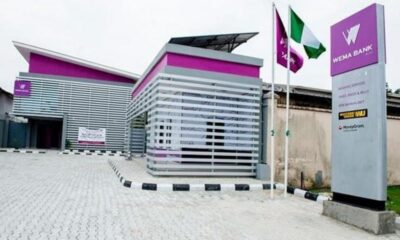Union Bank of Nigeria Plc, one of Nigeria’s leading banks, grew profit before tax by 2.8 percent from N24.7 billion in 2019 to N25.4 billion in the 2020 financial year.
The bank disclosed in the audited financial statements released on Thursday through the Nigerian Stock Exchange.
The bank said various investments in technology and building a progressive work culture in the last eight years helped navigate COVID-19 challenges as staff were able to effectively transition to remote working while still maintaining the strong performance required to provide these solid results.
Union Bank Financial Highlights for 2020:
● Profit before tax: up 2.8% to N25.4bn (N24.7bn in FY 2019).
● Gross earnings: down 1.9% to N156.9bn (N159.9bn in FY 2019).
● Net operating income after impairments: up 8.3% to N103.4bn (N95.5bn in FY 2019).
● Net interest income before impairment: up 10.1% to N56.9bn (N51.7bn in FY 2019) due to reduced interest expenses.
● Non-interest income: up 1.6% to N44bn (N43.3bn in 2019) driven by growth in net trading income as well as revaluation gains.
● Operating expenses: up 10% to N78bn (N70.8bn in FY 2019) due to an increase in regulatory and technology expenses.
● Gross loans: up 23.8% to N736.7bn (N595.3bn in FY 2019) driven by targeted lending to key sectors of the economy.
● Customer deposits: up 27.6% to N1,131.1bn (N886.3bn in FY 2019) reflecting our agility in delivering a compelling range of products to our customers during the pandemic and increased adoption of our digital channels.
● Non-performing loans ratio: down to 4% from 5.8% (FY 2019) driven by a disciplined recoveries strategy (N7.2bn in 2020), a more robust loan book and key restructurings to support customers during the pandemic.
Speaking on the performance, the Chief Executive Officer, Emeka Emuwa, said: “The Bank has delivered a strong set of results notwithstanding the impact of COVID-19 on our operations and the wider economy, enabling the Board of Directors to continue to return value to shareholders with a proposed dividend payment for the second year in a row. This demonstrates the strong foundations we have built, as we continue to deliver against our target of becoming a leading financial institution in Nigeria.
“For the full year, we grew across key income lines. Net income after impairments grew 8.3% from ₦95.5bn to ₦103.4bn and translated into 2.8% growth in Profit Before Tax to ₦25.4bn from ₦24.7bn.
“The core of this performance is driven by the growth in our loan book, with 23.8% increase in gross loans, to ₦736.7bn from ₦595.3bn in 2019.
“The pandemic accelerated trends in customer behaviour and we have seen rapid increase in digital adoption with a 38% YOY increase in active users on our UnionMobile channel with total active users now at 2.9 million. Our UnionOne and Union360 platforms for businesses grew by 11% from 25,000 users to 27,700 users. 94% of transactions in the Bank are now done digitally, up from 89% in 2019.
“We also aggressively grew UnionDirect (our agent network) by 6x from 3,100 to 18,100 in line with our focus on our retail business. With our investments yielding positive results, we are well positioned as a strong leader in the retail and digital space.
“In 2021, the Bank will focus on enhancing revenues and shareholder value by revving up customer acquisition, engagement and transactions through seamless customer journeys and an optimized service delivery platform.
“As I retire following eight years of rebuilding and repositioning this storied institution, I am convinced that with the excellent management team and a clear strategy in place, Union Bank is well positioned to continue to compete and deliver value to its shareholders.”
Speaking on the FY 2020 numbers, Chief Financial Officer, Joe Mbulu said: “We are pleased with both our top and bottom-line performance in 2020, in light of the impact of the pandemic and economic challenges. Significant inflationary pressures and the translation of currency depreciation drove growth in our cost base, however we maintained strong control, limiting operating expense increase to 10% (₦77.9bn from ₦70.8bn), well below the rate of inflation. Consequently, we saw marginal increase in our cost to income ratio to 75.4% from 74.1%.
“Our customer deposits hit a milestone during the year, crossing the ₦1tr mark to ₦1,131.1bn from ₦886.3bn in FY 2019, an increase of 27.1%. Low cost deposits were up by 17%, constituting 68% of total deposits helping to push cost of funds down by 1.4%.
“We continued to proactively manage our growing risk asset portfolio and recorded better asset quality, with our NPL ratio improving from 5.8% to 4.0%. This achievement, combined with a solid capital adequacy at 17.5% and continued top-line growth, provides the platform for strong growth going forward.
“We will continue to grow our loan portfolio in 2021, which we expect to be a significant driver of growth, combined with our value chain synergies across our business which will drive customer and transaction growth during the year and beyond.
“Our UBUK subsidiary remains classified as “Available for Sale” as the sale process continues albeit delayed due to the pandemic-induced lockdowns”


 Forex3 weeks ago
Forex3 weeks ago


 Naira2 weeks ago
Naira2 weeks ago
 Billionaire Watch2 weeks ago
Billionaire Watch2 weeks ago




 Naira2 weeks ago
Naira2 weeks ago




 Naira4 weeks ago
Naira4 weeks ago




 Naira2 weeks ago
Naira2 weeks ago


 Naira1 week ago
Naira1 week ago
 Banking Sector4 weeks ago
Banking Sector4 weeks ago




















